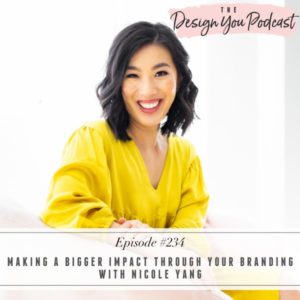
We are in a season of guests here on The Design You Podcast and some of the fabulous, incredible, inspiring people I have mentioned over the summer are starting to appear. They are going to inspire you and stretch your brain and thinking, and that’s for sure going to happen with today’s guest, Nicole Yang.
Nicole is our Graphic Designer and Brand Strategist here at Tobi Fairley Inc. and has worked with dozens of online women-owned businesses. She has an incredible belief system that is in alignment with her values, and she uses this to help people turn their ideas into meaningful, impactful design assets. She believes that through our work as business owners, we can create the world we really want to see, and her expertise in product, digital, and print design helps women-owned businesses grow confidently and bravely.
Listen in this week as Nicole and I dive deeper into content and branding and how she gives women-owned businesses the support they need in these areas. We share what capitalism fatigue is and how we can respond to it as business owners, the importance of showing not telling, and the four pillars of branding and how to use them in your business in a holistic, values-aligned way. Nicole also shares some of the amazing things she has lined up in her business, and what’s possible for you and your company.





